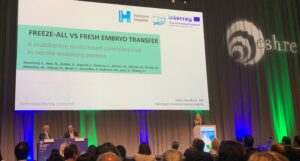 |
 |
The increasingly popular trend for fertility clinics to freeze all IVF embryos for later transfer has been shown in a large multicenter randomized trial to offer no improvement in delivery rates over traditional ‘fresh’ embryo transfers. ‘Our findings give no support to a general freeze-all strategy in normally menstruating women,’ said investigator Dr Sacha Stormlund from Copenhagen University Hospital in Denmark, who presented the results at the 35th Annual Meeting of ESHRE end of June in Vienna.
“The results of this trial were as we expected,’ said Dr Stormlund, ‘namely, to see similar pregnancy rates between the fresh and freeze-all treatment groups. So I think it can now plausibly be said that there is no indication for a general freeze-all strategy in women with regular menstrual cycles who are not at immediate risk of overstimulation in IVF.”
Behind the study lies an increasingly adopted strategy in assisted reproduction to freeze all embryos generated in a first cycle and transfer them after thawing in a later cycle (rather than as fresh embryos in the initial cycle). Some recent reports from registries in Japan and USA have suggested that there are now more frozen embryo transfers in IVF than fresh, with numbers still growing and many clinics claiming that outcomes can be improved with a freeze-all approach. However, despite the enthusiasm of clinics, most study results investigating the freeze-all vs fresh controversy have been inconsistent in their results.
This study, which aimed to test the claim of improved outcome in a general IVF patient population, was a large randomised trial involving 460 IVF patients at eight clinics in Denmark, Sweden and Spain and powered to provide a robust result. The patients were randomly assigned to test the two different treatment approaches, both of them with single blastocyst transfer: freeze-all with frozen embryo transfer in a subsequent cycle versus the control group with fresh transfer.
You can read the full press release here, which was amongst others featured by Ingeniøren (in Danish) and by The Mirror.

